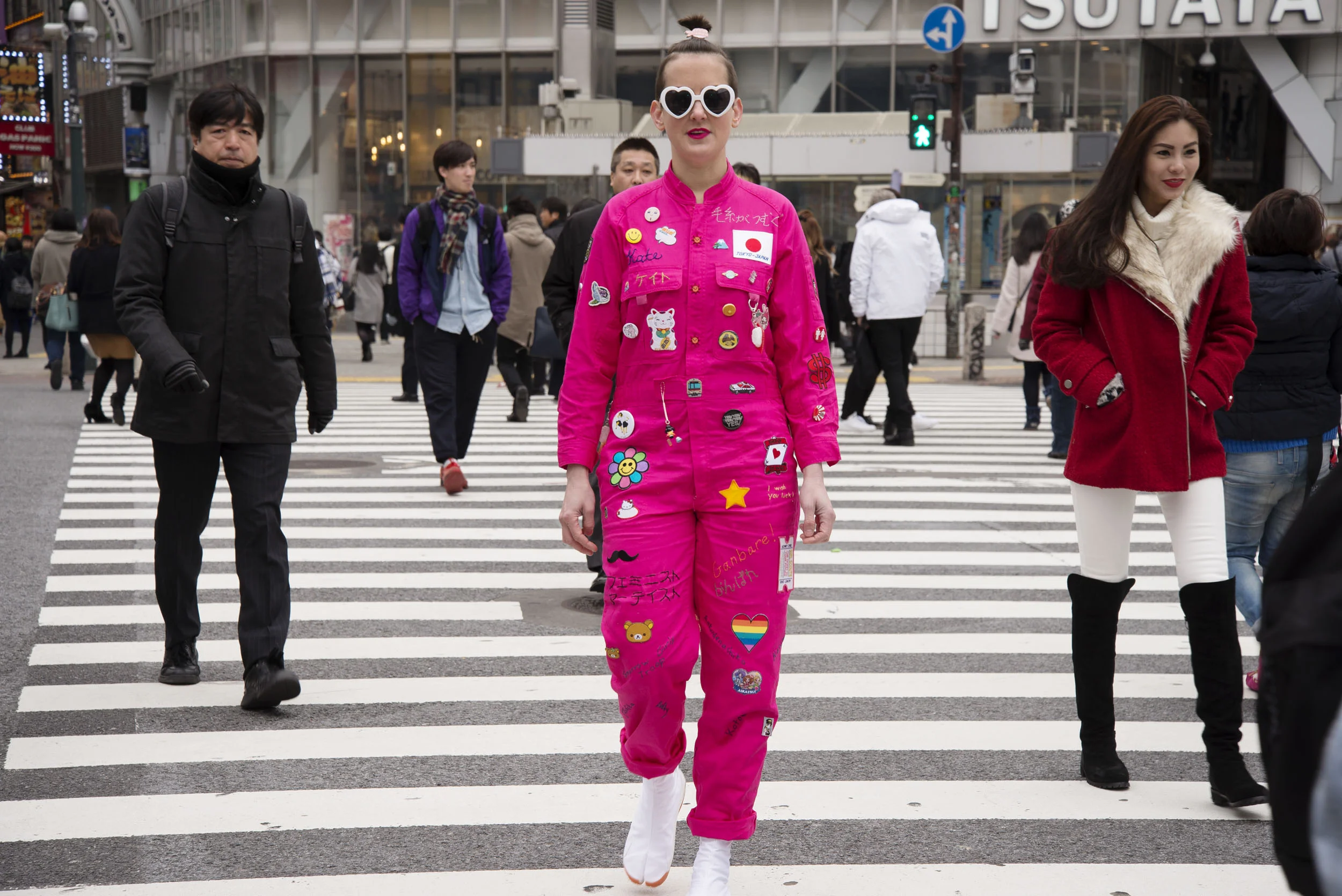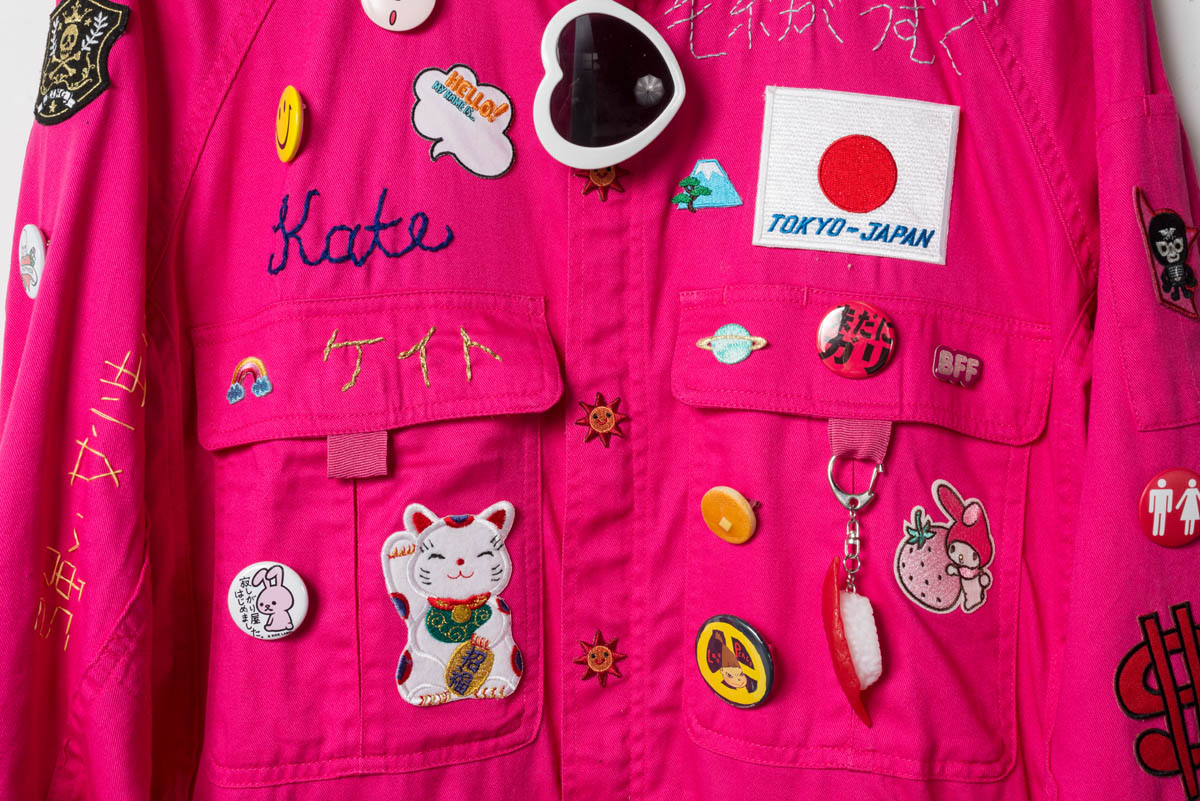FEMINIST FAN IN JAPAN AND FRIENDS
Youkobo Art Space, Tokyo Japan
2016
Curated by KATE JUST
Exhibiting artists: Kate Just (Australia)|Kotoe Ishii 石井 言絵 (Japan)|Kasumi Iwama 岩間 香純 (Japan)|Yoshiko Shimada 嶋田 美子 (Japan)|YU Shuk Pui Bobby (Hong Kong)|Megumi Igarash (Japan)|The Tomorrow Girls Troop 明日少女隊 (Japan / Korea / USA)
The exhibition Feminist Fan in Japan and Friends arose out of a two month residency at Youkobo Art Space in Tokyo between January and February 2016. Operating as a self-proclaimed “Feminist Fan in Japan,” I used my residency to connect with and pay tribute to a selected range of female artists working in Japan. Subsequently, this exhibition offered an intimate snapshot of the diversity, complexity, humour and seriousness of feminist practice in Tokyo and beyond.
I was represented in the show via a series of knitted works from my ongoing Feminist Fan series as well as my Feminist Fan in Japan Uniform. The Feminist Fan series comprises hand knitted renditions of important women artists and artist groups across the globe including Frida Kahlo, Cindy Sherman, Yoko Ono, The Guerrilla Girls, Kate Beynon, Tracey Moffatt, Pussy Riot, Claude Cahun and China’s Feminist Five. My Feminist Fan in Japan Uniform consists of a pair of hot pink zip up coveralls adorned with a series of texts, patches and badges. The coveralls were sourced from a worker’s uniform shop and resonated with me as the perfect item to describe my vision for feminism – fun and optimistic, but conscious of the work still to be done. The accoutrements on the suit include references to ‘kawaii’ (cute) female culture in Japan including Hello Kitty, flowers, small animals, tiny geisha and female anime stars. Plastered with these images, I embraced the place I was in and the materials around me. I also stitched onto the suit the names of all the female artists I met in Japan and messages of support I received on social media and during the residency. My evident fandom, of both Japan and feminism, also extends to the artists I selected to show alongside me.
My abiding adoration for iconic feminist artists includes the inimitable Yoshiko Shimada, a major figure in Japanese feminist art, raised in the shadows of the U.S. Air Force Base presence in Tachikawa near Tokyo. The artist is represented here by her 2012 video Becoming a Statue of a Japanese Comfort Woman, featuring the artist stationed on a chair outside the Japanese embassy in London. The work seeks to draw attention to the suppressed and silenced history of Japanese comfort women. With downcast eyes, golden makeup and her mouth taped shut, Shimada’s staunch occupation of the bustling London street powerfully re-enacts the recent peace monument of a Korean comfort woman that was erected outside the Japanese embassy in Seoul. As in her many other works, Shimada acknowledges and reinterprets supposedly shameful or forgotten female histories of violence and abuse and demands accountability.
Kotoe Ishii presents At Dawn, a new video work exploring her return to Japan after a twelve year period living and studying in Australia. In the video, Ishii attempts to process her residual feelings of displacement and frustration. After her time abroad, she is no longer able to neatly embody the rules or traditional notions of femininity as they seem to apply to her in Japan. Ishii stands in the middle of an open road. What initially seems like an open, breezy scene is soon characterised by a cold and inclement wind. Jarring cuts between the present moment and footage from Ishii's childhood point to an unsettling sense of time and place. Ishii continues to stand there, attempting to withstand the forces that bristle around her. Finally the video ends with a phone call, and the artist answers, “Hello?” but it seems like there is no one there. For Ishii, this play between light breeze and cold wind, between isolation and connection and between silence and speech are symbolic efforts to locate and hold onto, a secure sense of self.
Tomorrow Girls Troop are a politically active and inspiring global group who paper the walls of Youkobo with web, video, and text works that actively interrogate women's representation in media and last year’s top court ruling preventing married couples from maintaining their respective surnames. Through their projects and workshops, they urge that the equality of all sexes is the key to a happier society and emphasise the significance of women’s free expression. Embracing a social framework, the Tomorrow Girls Troop regularly gather in social settings such as pool parties and picnics to organise and work, encouraging a sense of female solidarity, community and friendship, both within their membership and in the world beyond.
Kasumi Iwama is a young artist from Japan, who like Ishii, regularly contends with a dualistic cultural and individual sense of identity garnered from years abroad. Her endearing sculptural work Hello Kasumi draws on the Japanese icon of cute and appealing femininity, Hello Kitty, to construct an oblique and intimate self-portrait. Hello Kitty’s official profile claims that she is "5 apples tall and weighs 3 apples." Though Kitty is thoroughly Japanese she “grew up in, and lives in London.” Iwama yearns for the integrated and simple bi-national identity that Hello Kitty so seamlessly embodies. Hence, she charts her own height in thirty-one accurately cast, shiny orange tangerines. Iwama’s somewhat phallic, juicy looking totem sprouts from a partial cast of the artist’s face at the base of the work, further manifesting Iwama’s emergent sense of identity.
Fresh from an art residency at Chiyoda Art Space in Tokyo, YU Shuk Pui Bobby sustains a preoccupation with sexual politics and female exploitation. Annoyed and amused with the incessant commodification of women in media, culture and everyday life, the artist seeks to impart an aspect of subjectivity to the female object. For her work You’re So Small, So UNIQUE, the artist cast her own small breasts and had them mass-manufactured by a factory in China as a set of silicone squishy “sex toys” to be trod over at the entrance of the gallery. Her work New Trend of Porn Magazine responds to magazines which advertise certain “types” of women, by creating a parody magazine cover that hawks the "bald artist” in her studio as a new and appealing type. Her CV by Vagina continues the artist's interest in reclaiming her body's agency, by listing her vagina's sexual and other experiences and its personal preferences on a generic Japanese resume form, sourced from the local 7-11.
Megumi Igarashi is an internationally known artist operating under the pseudonym Rokudenashiko, or “bad girl.” She works with painting, sculpture, and cartooning to challenge cultural repression surrounding the female body and sexuality. For works involving the sculptural representation of her own genitalia, including a giant yellow kayak and series of intentionally sweet, small plaster modeled garden scenes, Igarashi has been famously arrested multiple times. Despite the prevalence of pornography and other art and cultural ephemera in Japan which objectifies the female body, Rokudenashiko has been repeated charged with obscenity and suspicion of exhibiting obscene objects, leading to the confiscation of many of her artworks. For the show at Youkobo, Rokudenashiko undertook two Court Performances. The first involved the artist dressed as a cute female police officer, reading of all the charges laid against her in court. The second involved a comprehensive reading of her lawyer’s defense of her in court – arguments which have never before been available to the public or covered in any of the media accounts of her case. Most of these arguments focus on defining Rokudenashiko's work as art and not pornography, and placing her work within a genealogy of feminist artists around the globe. These one-off performances provided an opportunity for academics, artists and fans of Rokudenashiko to engage directly in dialogue with the artist and better understand her plight and significance in Japan.
Despite the readily apparent thematic and material differences between these exhibiting artists and their works, the works share some commonalities. Many of the artists have studied or worked extensively in other countries and contexts, strongly informing an expanded sense of feminism’s reach and significance. Conceptually, the female body is pivotal in each instance to expressions of agency, subjectivity and change. Furthermore, the works, in their all diversity, reach toward a more honest, celebratory, complex and flexible tomorrow.
Read the article on the exhibition by Spoon and Tamago here.
Click the links to find out more about each artist
Kotoe Ishii
Kasumi Iwama
YU Shu Pui Bobby
Megumi Igarashi
Yoshiko Shimada
Tomorrow Girls Troop


























